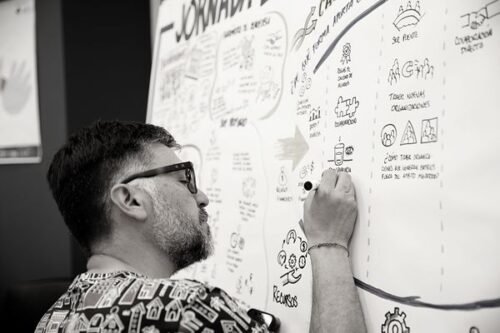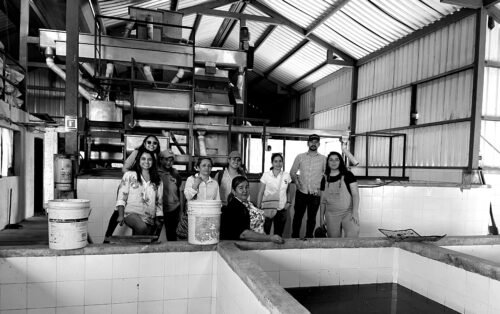
Today’s universities are challenged by the economic, social and ecological components that require changes in the world. These challenges call for global higher education reforms that are guided by the idea that universities “should play a broader and more direct role in promoting social and economic development ”. The perspective of social innovation in the management of educational innovation is key to addressing this paradigm.
Some questions to educational models arise from examples such as Brazil. This country has been downgrading the generation of knowledge in some scientific disciplines, questioning their contribution to society.
On the other hand, the increasing emergence of high-quality online learning platforms and unofficially recognized higher education programs also present challenges. The skills and knowledge that students require to be successful in their field of development are constantly changing and faster as technology advances.
From an institutional point of view, moreover, university accreditation processes increasingly require a contribution to the development of the cities and territories where these institutions develop their management. Added to this is the growing demand for inter and transdisciplinary research from some university rankings.
How does social innovation help meet these challenges?
Social innovation can be defined as a novel solution that is more effective, efficient and sustainable than the existing ones regarding a specific social problem. The satisfaction of social needs creates new relationships or possibilities for collaboration , impacting the ability of the social group to act.
This type of innovation works as a complex process that changes the basic routines, the flows of authority, resources and the belief system where it is inserted. In the light of education, this offers new perspectives without completely changing existing systems.
At the center of the concept of social innovation is also the involvement of citizens. This is understood as “ co-creation ” or “ co-production ” of solutions.
In this sense, social innovation not only responds to the needs for change in training, research and links with the environment. It is also a response to the operation of institutions that must face these changes and challenges.
While the concept may be novelGiven its principles, it is not alien to the work of higher education institutions. In fact, they have been practicing it in certain ways, with or without that name. This is incorporated into the management of educational innovation.
Climate Labs 2020 Project
In terms of the opportunities offered by the field of social innovation, we can divide the analysis from the four missions of the university:
-
In the formation:
It allows bringing students closer to the communities in a less welfare-oriented way. This contributes to the RSU and A+S with new methods and interdisciplinary views from co-created solutions .
Today it is natural to see social innovation courses even in business schools. Students there also require methods from disciplines such as sociology, psychology or social work.
Mention should be made here of the Students4Change project , which installed training modules in skills related to social innovation in more than 50 courses at 10 Latin American universities.
-
In research:
Social innovation causes university research to have a better impact on communities. This is achieved from a research production that is more relevant to the social and ecological problems of the nearby communities.
A social innovation strategy that impacts the research and transfer of the university pays attention to the generation of knowledge for the sector of social and ecological change.This becomes important as some universities place their emphasis on the commercial transfer of knowledge.
-
In the relationship with the environment:
Rather than “extending”, social innovation enables institutions to engage one on one with communities. At the same time, it places the university at the center of strategies for generating solutions to territorial problems.
Also, social innovation connects different universities to develop joint research , as we have seen with Academia B or the “Latin American Social Innovation Network” – LASIN project.
-
In relation to the institution itself (its own governance):
Social innovation proposes a culture that values errors and a system that democratizes decision-making within the university. When social innovation is installed in higher education institutions, the incentives change to focus them on training students who have the tools to change their environment.
According to the work of Ashoka U with Changemaker Campus Around the world, an institution that uses social innovation as a strategy for change and lives its values more intentionally can increase the institution’s ability to adapt, innovate, and be resilient, now and in the future.
Gaps in universities that have already taken the step towards social innovation
Several universities have already been advancing in social innovation, although with some gaps. In terms of training, there is a tendency to approach social innovation as a set of methodologies rather than as a systemic look at a social or ecological problem.
In this sense, problems are not explored in depth as other sciences do. Regarding research, there are different schools of thought regarding the definition of the term, which makes the work of academics challenging. This of course is not alien to a nascent discipline such as social innovation, and for this reason there must be a collective effort to advance more clearly in the field.
In terms of institutional development, higher education institutions have shown difficulties in adopting strategies quickly. Many times they are institutions that are very resistant to change and are late in coming up with the solutions that are needed.
We can see the low production of research from the south as a challenge, since this is mainly concentrated in Europe or the United States. A more Latin American approach with a better context of our culture, history, and problems would make the field of study more relevant to the agendas of our universities.
There is low South-South collaboration in terms of academic research. For this reason, it is necessary to promote more inclusive and sustainable processes in economic and social terms in the Global South.
Social innovation also requires from universities a different form of governance, more inclusive, transparent and co-created with students and the neighboring community. For this, it is necessary to set aside the authoritarian logic, academic jealousy, not very transparent and with little inclusion of key stakeholders that still persist in most of our case studies.
New perspectives for educational innovation management
Adopt social innovation as a university development strategy it depends on the will of each university community to face the new challenges and take advantage of the opportunities that this field of study offers. Intersectoral and interuniversity collaboration is essential and that is what the accelerator of university social innovation projects, Ashoka U Commons Latam, deals with.
As we mentioned, social innovation is in a nascent stage of development. Academic research continues to grow year after year and each semester new curricular and extracurricular programs related to this type of innovation appear in our universities.
Everything indicates that this will be a field that takes up the strategies of the case studies to enhance their role in promoting social and ecological change, update them to the new times and, why not, change them from within. Reinforcing the social component in the management of educational innovation will do the job.
Related Posts
Regeneration: a path of change towards hope
Regeneration is the action that proposes to restore what the planet has lost, beyond just minimizing its damage.
Read moreFinances at the service of the planet and contributing to its regeneration
We want to explore how finance can be, instead of a confrontation against the planet, an alternative to contribute to [...]
Read moreImpact investing in Colombia: ecosystem under construction
After various conversations with relevant stakeholders, we mapped impact investing in Colombia.
Read more


